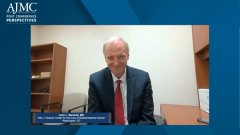
Utilizing RWE to Address Unmet Needs for CRC
Dr Marshall shares insights directed at the use of real-world evidence [RWE] and its impact on unmet needs in colorectal cancer [CRC] treatment.
John L. Marshall, MD: How do we show the value in what we’re doing, not just having a new bell and whistle to apply? It really is going to come from not treating some patients. You think about how much it costs to treat a single patient with adjuvant chemotherapy, just financially, and if we can reduce that number by, say, 25%, it would pay for everybody’s tests. On the other hand, do we need to keep giving it for as long? So efficiency in treatment, optimizing the kinds of treatments we’re giving, this is the kind of tool this will be. Reducing the number of scans afterward. Most of the studies being done now prospectively are monitoring for all of this. How does it alter our treatment practice? How does it alter outcomes? Minimizing the amount of therapy we need to give while optimizing and maintaining our outcomes. Proving value will be critical as we move forward.
I’m somewhat of a cynic about the other side of this coin [of real-world evidence], of clinical research evidence. Back in the day, clinical trials were not nearly so rigid or specific. Now it’s really hard to find patients who are eligible for clinical trials because they have to be so squeaky clean, in essence not real-world kinds of patients. I think real-world evidence is critical. I coach our team here at Georgetown [University], that as we spend way too much time in front of our electronic medical records, we are doing the kind of data entry that can be abstracted later to demonstrate this real-world evidence you’re talking about. I do think, while clinical research helps us isolate a given question and answer, it doesn’t necessarily mean those data will translate to the rest of everybody else who’s got comorbidities, who doesn’t fit exactly the clinical trial. I think we have to increase the emphasis on real-world evidence and not minimize it.
Transcript edited for clarity.
Newsletter
Stay ahead of policy, cost, and value—subscribe to AJMC for expert insights at the intersection of clinical care and health economics.










